GCSE and A-level results: Q&A on how 2020 grades are decided
- Published
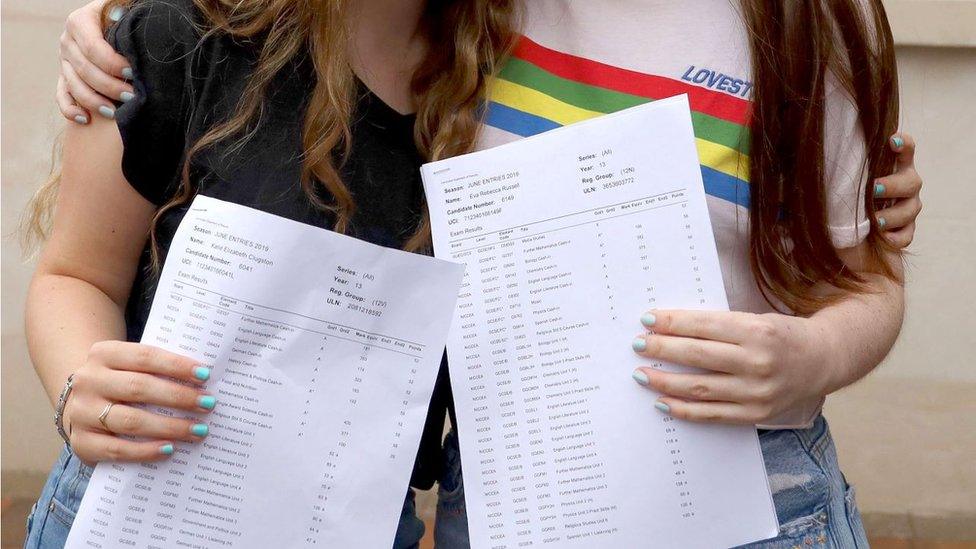
Some significant revision has gone into GCSE, AS-level and A-level results
After widespread controversy over how A-level and AS-level grades were awarded, Stormont's education minister made two significant U-turns this week.
Peter Weir firstly announced changes to how GCSE results, which came out on Thursday, were decided.
He then also changed his mind on existing A-level and AS-level grades, which students received last week.
His revised position follows similar U-turns in Great Britain - firstly in Scotland, then Wales and then England.

What is happening to this year's exam results in Northern Ireland?
All this summer's GCSE, A-level and AS-level examinations in Northern Ireland were cancelled because of the coronavirus pandemic.
Students were told in April that instead of sitting final exams, their grades would be predicted by their teachers and those predictions would then be checked externally to ensure fairness.
Northern Ireland's exams board - the Council for the Curriculum, Examinations and Assessment (CCEA) - was asked to standardise results in case some teachers were too generous or too harsh.
But when A-level and AS-level results were published last week, CCEA's results showed that more than one third (37%) of grades calculated by schools had been downgraded through standardisation.
Many students and teachers complained of unfairness, and both CCEA and Mr Weir faced widespread criticism.
On Monday, the minister abandoned standardisation at GSCE level and announced that this year's GCSE results would be based solely on grades predicted by teachers.
Hours later, he then announced changes to A-level and AS-level results, saying students will now be awarded the highest grade either predicted by their teacher or awarded by standardisation.

Why has the NI education minster made these U-turns?

Peter Weir said he had "listened" to concerns about standardisation
Education Minister Peter Weir was facing mounting criticism over the handling of this year's A-level and AS-level results after complaints that many students were awarded lower than predicted grades.
In the Northern Ireland Assembly last week, he faced demands to explain how the standardisation process or "algorithm" had been applied.
Mr Weir initially defended CCEA's system and he resisted calls to scrap the results in favour of grades calculated by schools.
He said standardisation was required to maintain "credibility" in the results and argued CCEA's method was the "least worst solution" in a year when students could not sit tests.
On Monday morning however, Mr Weir decided against using a similar system for GCSE results and said they would be based on teachers' predicted grades alone.
He also suggested that if there was a change to how A-level and AS-level results were awarded in Great Britain, changes would likely follow in Northern Ireland.
By Monday afternoon, following similar announcements in England and Wales, Mr Weir said teachers' A-level and AS-level grades would be accepted in cases where they were higher than CCEA's results.

What was the reaction to Peter Weir's decision to use teachers' predicted grades?

Students protested outside the Education Authority in Belfast ahead of Monday's U-turn
The changes announced by the Democratic Unionist Party (DUP) minister were widely welcomed by students and teaching organisations as well as other political parties in the Stormont Assembly.
However, some criticised the length of time it took the minister to reverse his position, highlighting the stress and anxiety felt by students over the past few days.
"We welcome the decision to put an end to the grading fiasco of using only standardised grades," said the Association of School and College Leaders (ASCL).
"Students, parents, and teachers will breathe a sigh of relief after days of confusion and delay."
NUS-USI President Ellen Fearon said students "should never have had to face the worry and stress that this situation has caused".
She commended those who took part in protests across the UK to challenge government policy.
"This victory belongs to students who would not accept their futures being decided by an unjust algorithm," Ms Fearon added.

Will using predicted grades cause grade inflation?
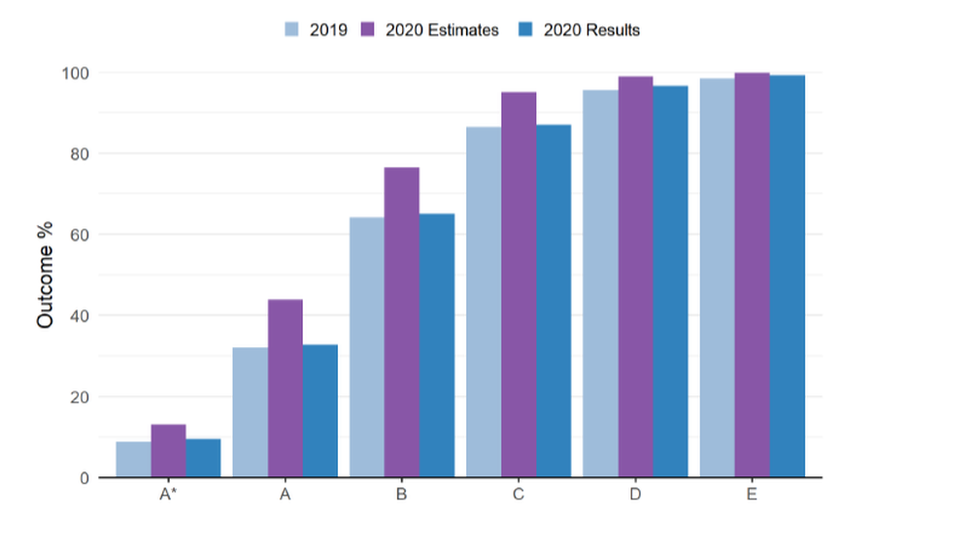
Teachers' predicted A-Level grades (purple bars) were higher than the 2019 results and the 2020 standardised grades
Yes. Data released by CCEA shows that at A-Level, about 44% of grades are now at A* or A, instead of just under a third (32.8%) and just over 95% of A-Level grades awarded to students are now at A* to C - up from 87%.
Meanwhile, in terms of GCSEs, grades A*-A were awarded to 37.1% of entries, up from just under a third of entries in 2019.
Last week, Peter Weir had said if teachers' predictions alone were used, grades would not have "any level of credibility" because results would be so much higher than previous years.
Following his U-turn on Monday, Mr Weir said "concerns remain" over the impact of changes to UK qualifications system but added "any potential solution offered has its flaws".
The minister added his "prime concern is to ensure that young people in Northern Ireland are in no way disadvantaged in comparison to their peers elsewhere".
The Association of School and College Leaders said Mr Weir's U-turn "will, of course, mean that there is grade inflation this year, but that is a small price to pay for remedying the manifest injustices produced by the statistical model used to moderate grades".

Will the A-level U-turn mean greater competition for NI university and college places?
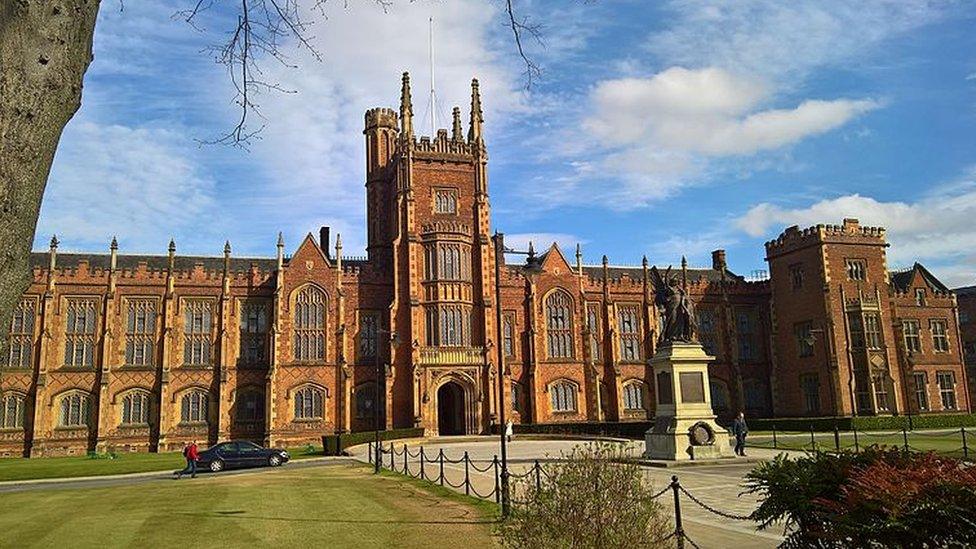
Queen's University Belfast is seeking "urgent" clarity after the U-turn on predicted grades
Possibly. Queen's University Belfast (QUB) has warned that it may need extra government-funded places to admit all students whose results would be raised.
QUB said it did not yet have access to the revised grades being awarded to students.
"Only once this is received will the university be able to confirm places for students who may now meet the conditions of their offer," QUB added.
The Northern Ireland Executive controls the number of undergraduate places available at Queen's and Ulster University (UU) for students from Northern Ireland.
QUB said it is now seeking "clarity as a matter of urgency" on a number of issues.
- Published20 August 2020
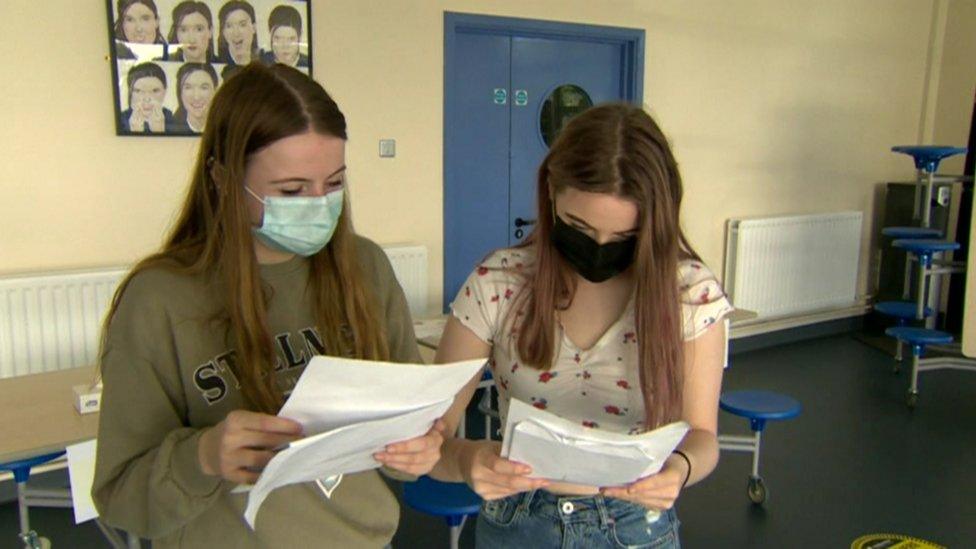
- Published17 August 2020
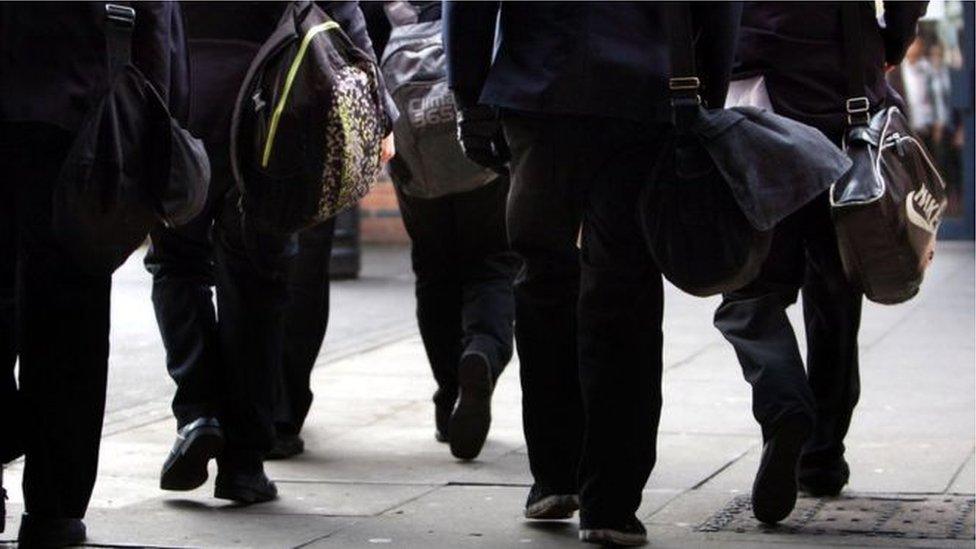
- Published14 August 2020

- Published13 August 2020

- Published17 August 2020
